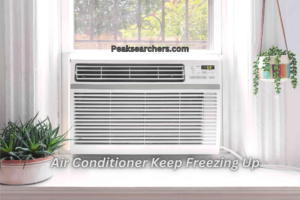Why Does My Air Conditioner Keep Freezing Up? A DIY Guide
At Peaksearchers, we understand the frustration of dealing with a constantly freezing air conditioner. It can be particularly troublesome during the hot summer months when you rely on your AC system for comfort and relief
Being an expert, and experienced, I also faced the same issue. The AC was freezing up and I was unable to figure out why was it happening. One of my friends, who were professional guided me.
That’s why we’re here to provide you with valuable insights into the possible causes of your air conditioner freezing up and offer practical solutions to help you prevent this issue in the future. By addressing these concerns, we aim to help you maintain optimal performance and extend the lifespan of your cooling system.

Understanding the Problem
When your air conditioner freezes up, it means that moisture in the system has formed ice on the evaporator coils. This ice buildup restricts proper airflow, reducing the efficiency of your AC unit and potentially leading to a complete breakdown if left unattended. Several factors can contribute to this problem, including:
1. Insufficient Airflow
Poor airflow is often a key culprit behind frozen air conditioners. It can occur due to:
- Clogged air filters: Over time, air filters accumulate dust and debris, obstructing airflow. Regularly changing or cleaning your filters is essential to maintain proper airflow.
- Blocked vents: Ensure that vents and registers are not blocked by furniture, curtains, or other obstructions. Obstructed vents impede the airflow, causing ice formation.
2. Low Refrigerant Levels
Refrigerant is a vital component of your air conditioning system, responsible for absorbing and releasing heat. If your AC is low on refrigerant, it can result in low pressure, causing the evaporator coils to freeze. Common causes of refrigerant loss include leaks in the system, improper installation, or manufacturing defects.
3. Thermostat Issues
A malfunctioning thermostat can lead to temperature imbalances and irregular cooling cycles, which can cause freezing. Ensure that your thermostat is calibrated correctly and consider upgrading to a programmable thermostat for better temperature control and energy efficiency.
4. Dirty Coils
Over time, the evaporator coils in your air conditioner can accumulate dirt and grime, hindering heat absorption and causing the coils to become excessively cold. Regular maintenance, including professional coil cleaning, is essential to prevent freezing due to dirty coils.
5. Fan Problems
Issues with the fan motor or fan blades can disrupt the airflow, leading to freezing. Faulty fan motors may not circulate air effectively, while damaged blades may cause air turbulence. Regular inspection and maintenance of the fan components can help prevent these problems.
Mechanical Malfunctions
1. Faulty Blower Fan
Engage the services of a professional technician to inspect and repair any issues with your blower fan. They will ensure that the fan is functioning correctly and maintaining adequate airflow.
2. Malfunctioning Thermostat
A malfunctioning thermostat can cause your air conditioner to run continuously or cycle improperly, leading to freezing. It’s crucial to ensure that your thermostat is calibrated correctly and communicating effectively with your cooling system. If you suspect a thermostat issue, consult an HVAC professional to diagnose and resolve the problem.
3. Defective Expansion Valve
The expansion valve regulates the flow of refrigerant into the evaporator coils. If the valve becomes faulty or gets stuck in an open position, it can cause the coils to freeze. A trained technician can diagnose and repair any issues with the expansion valve, restoring proper function to your air conditioner.
Environmental Factors
Apart from internal system problems, certain environmental factors can contribute to your air conditioner freezing up. Consider the following:
1. Inadequate Insulation
Insufficient insulation in your home can result in cold air seeping into your air conditioning system. This cold air can cause the evaporator coils to drop in temperature and eventually freeze. Proper insulation throughout your home, particularly in attics and crawl spaces, can help prevent this issue.
2. High Humidity
Excessive humidity in your living space can also contribute to freezing problems. When humidity levels are too high, moisture can accumulate on the coils, leading to ice formation. Implementing dehumidification measures, such as using a dedicated dehumidifier or ensuring proper ventilation, can help reduce humidity levels and alleviate freezing issues.
Preventive Measures
To avoid air conditioner freezing issues and ensure smooth operation, follow these preventive measures:
1. Regular Maintenance
Schedule regular maintenance appointments with a qualified HVAC technician. They will inspect your system, clean the coils, check refrigerant levels, and identify any potential problems before they worsen. Routine maintenance can significantly reduce the chances of your air conditioner freezing up.
2. Clean and Replace Air Filters
Clean or replace your air filters every one to three months, depending on usage and manufacturer recommendations. This simple step helps maintain proper airflow, preventing ice formation on the evaporator coils.
3. Keep Vents Clear
Ensure that all vents and registers in your home are clear of any obstructions. Proper airflow is crucial for your air conditioner’s efficiency and for preventing freezing. Additionally, consider regular cleaning of vents to remove dust and debris.
4. Check for Refrigerant Leaks
If you suspect a refrigerant leak, contact a professional HVAC technician to inspect and repair the issue. They will identify the source of the leak, fix it, and recharge your system with the appropriate amount of refrigerant. Remember, refrigerant leaks should always be handled by professionals.
5. Optimize Thermostat Settings
Set your thermostat to an appropriate temperature for your comfort and to avoid temperature fluctuations that can contribute to freezing. Consider a temperature range between 72°F (22°C) and 78°F (25°C) for optimal cooling efficiency.
6. Ensure Proper Insulation
Proper insulation plays a crucial role in maintaining a consistent temperature within your home. Inspect doors, windows, and any areas where cool air may escape or warm air may enter. By sealing these gaps and improving insulation, you can help your air conditioner operate more efficiently and reduce the risk of freezing.
7. Keep the Outdoor Unit Clear
Make sure the outdoor unit of your air conditioner is free from obstructions such as debris, leaves, or overgrown vegetation. Restricted airflow around the unit can hinder proper heat dissipation, leading to freezing. Regularly inspect and clean the outdoor unit to maintain optimal performance.
8. Consider Professional Duct Cleaning
Over time, dust, allergens, and debris can accumulate in your ductwork, restricting airflow and reducing your air conditioner’s efficiency. Professional duct cleaning can help improve airflow and prevent issues that contribute to freezing. Consider scheduling duct cleaning every few years or as recommended by experts.
9. Seek Professional Help
If your air conditioner continues to freeze up despite following preventive measures, it’s essential to seek professional assistance. HVAC technicians have the expertise to diagnose complex issues, perform necessary repairs, and ensure your cooling system operates at its best.
Also Read: What Size Generator To Run Air Conditioner? A Detailed Information
FAQ’s
How do you unfreeze an air conditioner fast?
To unfreeze an air conditioner quickly, follow these steps:
- Turn off the air conditioner:
- Turn on the fan:
- Check the air filter:
- Examine the vents:
- Inspect the evaporator coil:
- Allow time for thawing:
- Clean the unit:
- Restore power:
- Monitor performance:
If the air conditioner continues to freeze up or experiences recurring freezing issues, it is recommended to contact a professional HVAC technician to diagnose and resolve any underlying problems.
Can a dirty filter cause AC to freeze?
Yes, a dirty filter can cause an air conditioner to freeze. The air filter plays a crucial role in the proper functioning of an AC system by capturing dust, debris, and pollutants from the air before it is circulated throughout the unit. Over time, the filter can become clogged with accumulated dirt and restrict the airflow.
When the airflow is restricted due to a dirty filter, the air conditioner’s evaporator coil may not receive enough warm air to keep it from getting too cold. As a result, condensation on the coil can freeze, leading to ice buildup. This ice formation can further impede the airflow and reduce the cooling efficiency of the system.
A dirty filter not only contributes to freezing but also puts strain on the air conditioner’s components, including the fan and compressor, leading to potential damage and increased energy consumption. Regularly cleaning or replacing the air filter is an essential maintenance task to ensure proper airflow, prevent freezing, and optimize the performance and longevity of the air conditioning system
How do you fix a frozen AC coil?
- Turn off the air conditioner: Immediately shut off the air conditioner once you notice that the coil has frozen. Continuing to run the unit can cause further damage.
- Allow the coil to thaw: Let the coil thaw naturally by turning off the cooling mode and running the fan mode only. This will help circulate warm air and speed up the thawing process. It may take several hours for the coil to completely thaw.
- Check for airflow restrictions: Inspect the air filter, vents, and return air registers. Clean or replace the air filter if it is dirty or clogged. Ensure that all vents are open and unobstructed. Clear away any objects or furniture blocking the airflow.
- Inspect the evaporator coil: Once the coil has thawed, carefully examine it for any remaining ice or frost. If there is still ice present, do not attempt to remove it forcefully. Allow it to melt naturally.
- Clean the coil: Once the ice has melted, clean the evaporator coil to remove any dirt, dust, or debris that may have contributed to the freezing. Use a soft brush or a coil cleaner specifically designed for evaporator coils. Follow the manufacturer’s instructions for safe and proper cleaning.
- Check refrigerant levels: Low refrigerant levels can cause the coil to freeze. If you suspect a refrigerant leak or low levels, it is best to contact a professional HVAC technician to inspect and recharge the refrigerant system.
- Test the system: After cleaning the coil and addressing any airflow restrictions or refrigerant issues, turn on the air conditioner and monitor its performance. Ensure that the air is flowing smoothly and the coil remains free of ice.
Air conditioner freezes up with ice?
- Low refrigerant levels: Inadequate refrigerant levels can cause the evaporator coil to become too cold and freeze. This problem typically requires professional assistance. Contact a licensed HVAC technician to inspect and recharge the refrigerant system if you suspect low levels or a refrigerant leak.
- Thermostat problems: Incorrect temperature settings or faulty thermostat sensors can cause the air conditioner to run excessively and result in freezing. Verify that the thermostat is set to an appropriate temperature and functioning correctly. If necessary, recalibrate or replace the thermostat.
- Insufficient insulation: Lack of proper insulation around the refrigerant lines can cause temperature imbalances, leading to freezing. Ensure that the insulation is intact and adequately covering the refrigerant lines.
- Dirty evaporator coil: Dust and debris accumulation on the evaporator coil can hinder heat exchange and airflow, causing freezing. Clean the evaporator coil carefully using a soft brush or consider scheduling professional maintenance to clean it thoroughly.
- Fan problems: Malfunctioning fan motors or damaged fan blades can disrupt proper airflow and contribute to freezing. Inspect the fan motor and blades for any issues. If necessary, consult an HVAC technician to repair or replace faulty components.
Also Read: How to Fix Air Conditioner Leaking Water Inside Car? A Comprehensive Guide
Conclusion
Dealing with a freezing air conditioner can be frustrating, but by understanding the underlying causes and taking preventive measures, you can maintain optimal performance and prevent future freezing issues.
Remember to prioritize regular maintenance, clean and replace air filters, optimize thermostat settings, and keep vents clear. Address any refrigerant leaks promptly and ensure proper insulation throughout your home. By implementing these practices, you can enjoy efficient and uninterrupted cooling during the hot summer months.


